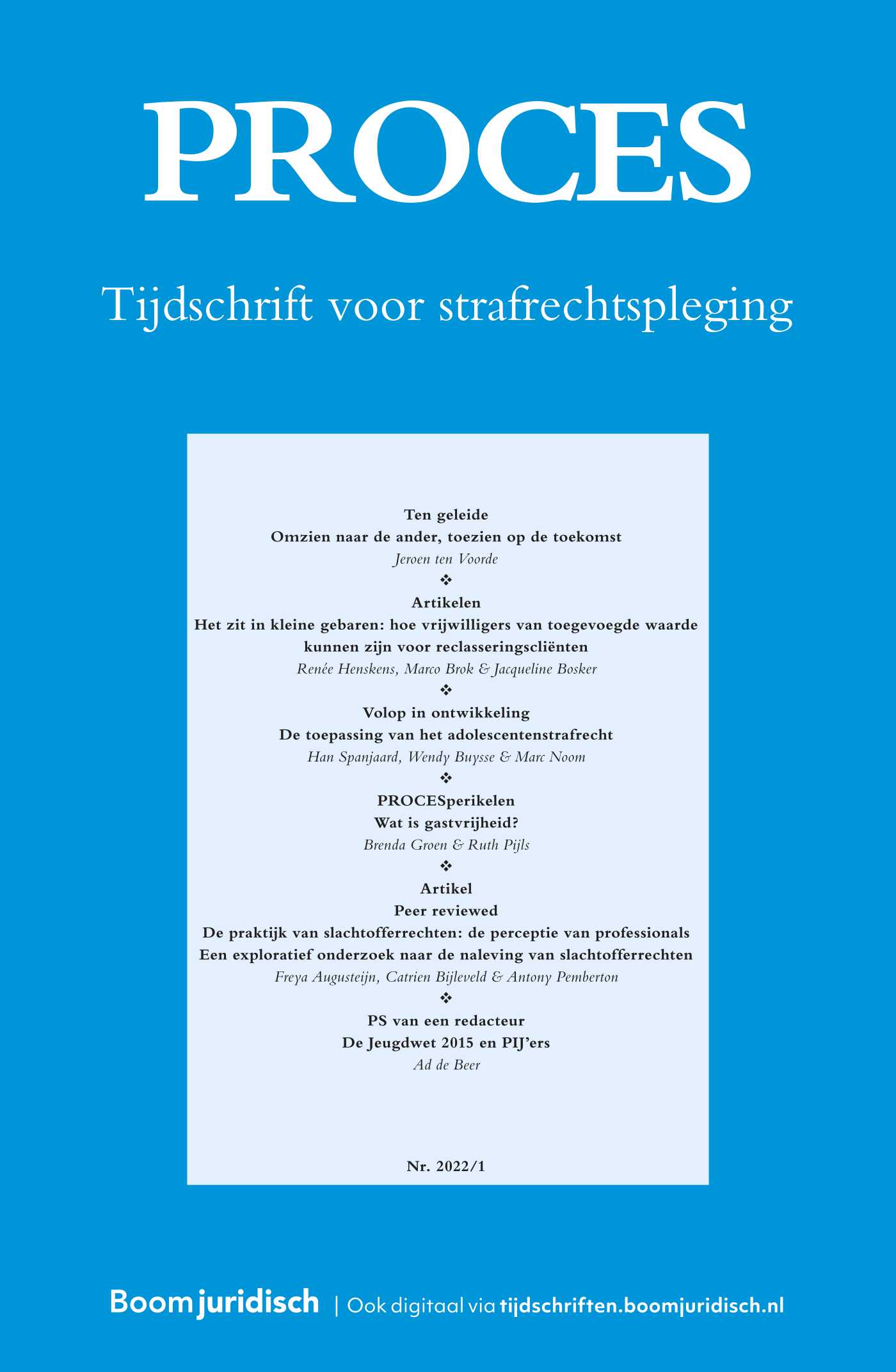|
Half of Dutch police has no confidence in the criminal justice system. Police officers complain that it is impossible to tackle crime and disorder, because as they believe, prosecutors and judges are often letting them down. This article discusses an empirical study on police attitudes towards criminal law in The Netherlands. It is found that many police officers don’t know much about the legal proceedings that follow police work. A description is presented of how police officers think about legal questions: conviction, sentencing and detention on remand. It is concluded that there is a tension between on the one hand, the operation goals of order following a moral duty to restore street justice, and the protection of legal rights of individual citizens on the other. Subsequent recommendations have to do with the working relationship between police and the judiciary. |


PROCES
Meer op het gebied van Criminologie en veiligheid
Over dit tijdschriftMeld u zich hier aan voor de attendering op dit tijdschrift zodat u direct een mail ontvangt als er een nieuw digitaal nummer is verschenen en u de artikelen online kunt lezen.
| Redactioneel |
Even centraal? Transities naar centralisatie of decentralisatie in de veiligheidszorg |
| Auteurs | Mr. dr. Sigrid van Wingerden |
| Auteursinformatie |
| Artikel |
Vertrouwen van politiemensen in de strafrechtspleging |
| Trefwoorden | politie, strafrechtsketen, cynisme |
| Auteurs | Jelle Kort MSc en Prof. dr. ir. Jan Terpstra |
| SamenvattingAuteursinformatie |
| Artikel |
Bedreigende rap en de kunstexceptie |
| Trefwoorden | Kunstexceptie, Bedreiging, Artistieke vrijheid, Vrijheid van meningsuiting, Strafuitsluitingsgronden |
| Auteurs | Mr. Sven Bakker en Veerle van de Wetering LL.B. |
| SamenvattingAuteursinformatie |
|
In several Dutch criminal cases rap artists have invoked the ‘exceptio artis’ as a ground for justification in court. In this article Bakker and Van de Wetering research the possibilities of successful appeals in such cases. Both the meaning and scope of the ‘exceptio artis’ are taken into consideration, consulting the literature and ECtHR case law on article 10 ECHR. Furthermore the contribution also deals with Dutch case law on the ‘exceptio artis’ and rap lyrics that were held punishable so as to clarify the seldom discussed relationship between rap and the ‘exceptio artis’. |
| Praktijk |
Slachtofferhulp in de praktijk: ervaringen van een vrijwilliger |
| Auteurs | Rianne Gelissen MSc |
| Auteursinformatie |
| Artikel |
Het werk van de familierechercheur: een bron van stress of een bron van persoonlijke groei? |
| Trefwoorden | Familierechercheurs, werkgerelateerde stress, secundaire traumatische stress, secundaire posttraumatische groei |
| Auteurs | Marieke Saan MSc, Lidewij Bollen MSc en Dr. Mr. Maarten Kunst |
| SamenvattingAuteursinformatie |
|
Dutch family liaison officers inform and support trauma victims or their relatives. Recent studies suggest that professionals working with trauma victims may develop work-related stress. However, other studies have shown that professionals can also develop personal growth from their experiences with traumatized persons. This study was the first to investigate to what extent Dutch family liaison officers experience work-related stress or personal growth. Results suggest that the majority of the respondents experience no or very low levels of work-related stress. Levels of personal growth appear to be rather low as well, but seem to be more broadly dispersed. These findings suggest that Dutch family liaison officers are able to cope with the potentially negative effects of their work and even experience positive outcomes from working with traumatized persons. In spite of this, many participants provided suggestions for further improvement of their work practices. |
| Artikel |
Herstelgericht reclasseren: De contextuele benadering als kader voor herstelgericht werken |
| Trefwoorden | Herstelrecht, Reclassering, Contextuele hulpverlening, Contextuele therapie, Herstelbemiddeling |
| Auteurs | Ewout Openneer MCH |
| SamenvattingAuteursinformatie |
|
Restorative Justice could have a more extensive implementation within criminal justice if there was more restorative practice within probation work. This may also lead to more restorative mediation. This article is based on practice-based research on what is known about restorative practices within probation and how contextual therapy, developed by the Hungarian-American psychiatrist Ivan Böszörményi-Nagy, can contribute to this. The main conclusion is that contextual therapy can offer a currently non-existent framework that is needed to be able to work with restorative practices within probation. This article describes how contextual approaches can be useful for probation officers. |
| Column |
De taptolk en de Wbtv – weg ermee! |
| Auteurs | Mr. Rob Van Noort |
| Auteursinformatie |
